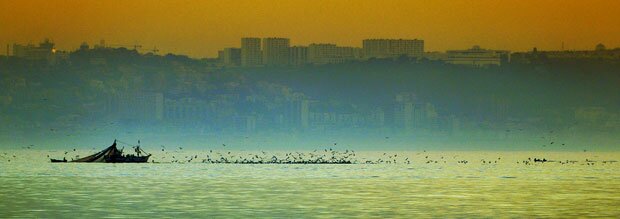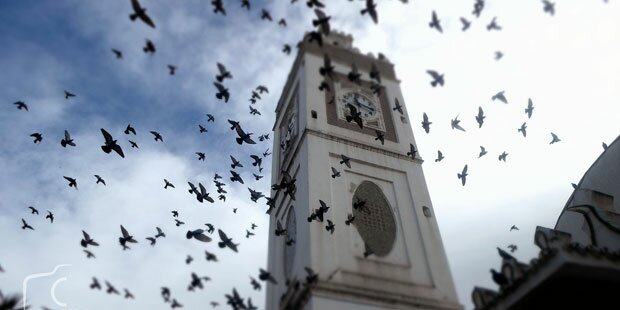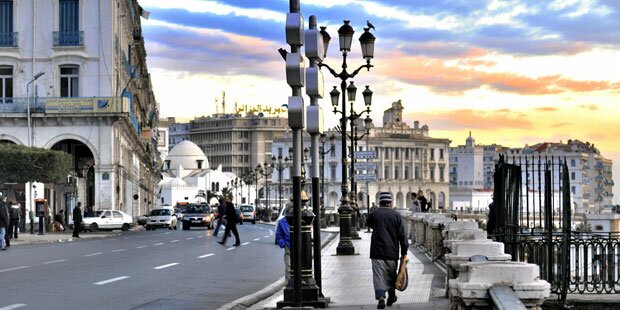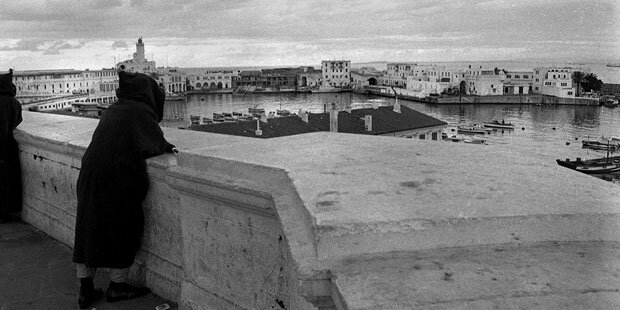 Downtown Algiers, Didouche Mourad Street. Photo CC: Samy Lamouti.
Downtown Algiers, Didouche Mourad Street. Photo CC: Samy Lamouti.
Who is this Rip Van Winkle of Algiers, this writer who left the country before oil glut and Islamist insurrection and civil war and halfhearted neoliberal reforms and new-money investment all one after another transformed his city, who comes back after thirty years’ absence in France and somehow expects to find his city unchanged and immobile? Mohammed Kacimi’s return to Algiers and search for a place to get an evening drink reads like a parody of declinism, but judging from his responses to readers, he is not making fun of colonial nostalgia here. Contrary to Kacimi, most accounts suggest finding a decent bar is still possible in Algiers; as for the state of the city’s cinemas however, it is every bit as bad as Kacimi says.
Algiers is a city of light. But when night falls, it becomes an abyss. At around 5 pm, just before thousands of minarets all start howling for the sundown prayer, the streets abruptly empty of all the women and girls, many of whom are anyway covered up from head to toe. What is left on the street, gummed to the walls, is a magma of men: bearded or mustached or mohawked, sodden with hair gel and smoking cigarette after cigarette.
At this moment, Algiers becomes an avalanche of gloom. Everything is falling apart: the men, the stained and starving yellowish cats, the Haussmanian buildings with their frozen and broken elevators. Even the sea is nowhere to be found, lost under a layer of boats dripping diesel, bananas, semolina, Chinese garlic, and turkey steaks imported from Patagonia. The sky is black, filled with the perfume of Algiers, a mix of piss and sardines frying in oil.
I was there just three weeks ago. And one night, I couldn’t say exactly why, I decided to go out and have a beer somewhere. Why? Just for the heck of it.

I push open the door to find the place empty; two waiters lost among the dirty red tablecloths welcome me:
“Are you here for a drink?”
“As a matter of fact.”
“We do not serve alcohol anymore.”
The younger of the two men serves me up a contemptuous look. I ask him if there is another bistro nearby.
“No, I won’t tell you that. It is haram.”
I slam the door. Well, I think to myself, all I have to do is walk nearby, to Charasse Street, to the Marhaba, a bar that offers excellent ground beef sandwiches made with fresh cilantro. Right next door is the Dominique bookstore, where I once bought the complete works of Solzhenitsyn and Mayakovsky for ten dinars.
I go to Charasse street. There is no more Marhaba. And no more ‘scientific bookstore.’ The Dominique has become an ‘Ijtihad’ bookstore- Quranic exegesis.

Ok, I think: all I have to do is head down toward Mauretania. At the very end, there’s the Mauretania Brasserie, right in front of the big blue Air France building. And if they’re closed, I can just take a left up Amirouche Boulevard, walk past the Fine Arts store and the Arc en Ciel to get to the Boul Mich. The bar is right next to the university restaurant. It has a room in the basement with a dance floor, and all of its windows open out onto the port of Algiers. We used to hang out there; we’d order piles of sardines and white wine with our girlfriends while they smoked Craven A’s.
I take Charasse Street. The bar has been replaced by a furniture store. The Air France building no longer exists; nor does the Arc en Ciel. I push open the door of the Boul Mich. Instead of girls smoking Craven A’s, a crowd of bearded guys sipping milky coffee and sucking eagerly on e-cigarettes. I go out. In front of the central police commissariat, under the arcades of the Bank of Algeria, dozens of women with their babies and children were arranging their bedding for the night: pieces of cardboard and blankets. I ask a policeman what the hell is going on. Young brides he tells me, thrown out by their husbands. They camp out in front of the police station to avoid being raped. They leave early in the morning.
Then I remember the Coq Hardi [The Bold Rooster], that legendary Algiers bar. I used to hang out for hours there with Wahab. It is halfway up Didouche Mourad Street. A double row of bay windows on the street, waiters in bow ties, vendors would come through to hawk Le Monde. I take Berlioz street, which no longer has the Berlioz; at the top of the stairs at the end of the street, a gaping hole has replaced the Parisienne Bakery… oh how I remember the croissants of the Parisienne. Well, I think, I will take the subterranean passage that goes under Audin Square. On the stairs there was always a blind banjo player, and inside, the record shop whose long haired owner introduced me to Aphrodite’s Child and their album 666.
Deep inside the tunnel, there was a coin-operated scale and a mechanical fortuneteller. You would put a 20-centime coin in it and it would spit out a piece of paper, always with the same prediction on it: “Good morning, you will be very happy and know much happiness.” I long suspected [former president]Boumediene himself of being the author of the messages from this diabolical fortuneteller. In the passage now there are no more musicians; they have been replaced by street vendors who sell fake Nikes and authentically red underwear. The record shop is gone, its owner surely a grandfather now who has sold his rock and roll collection to pay for a pilgrimage to Mecca and wash away the ‘sins of his past,’ as they say.

Further up, I look for the Coq Hardi but I cannot find it. I stopppeople on the street to ask after it.
“The Coq what?”
“The Coq Hardi? That sounds weird, what is it, something from the French colonial days?”
“No, from the days of Boumediene.”
“And they actually used names like that? Anyway, what’d they do, sell chicken or something?”
“No, it was a bar.”
The exchange would generally end there, with my interlocutor telling me “may God help you return to the true path.”
Finally I run into a local guy who grew up in the neighborhood.
“What are you looking for?”
“The Coq Hardi. Am I dreaming, or wasn’t it right here? On this sidewalk?”
“Yeah, but the City demolished it.”
“Why?”
“Because it was causing traffic problems.”
“But it wasn’t in the middle of the road, it was on the sidewalk.”
“Yes exactly, and people liked to have their drinks out on the terrace, which was bothering people who were driving by in their cars.”

And yet this bar was central to the history of the Battle of Algiers. I head back up Didouche Mourad Street, noting that both the Ibn Khaldun and the Fine Arts bookstores have been closed. The Algeria Cinema has gone the way of all the bistros, and with it the Debussy, the Tassili, the Cafette, the Quatz’Arts, the Kenko.
I walk all the way up to the Rostand, now transformed into a shoe store. As for the Debussy, once among the most beautiful theaters in the city, it has become a garbage dump, just like the Francais. At the Debussy, I think I saw every one of Visconti’s movies, and I was even there for the riots that were provoked by the showing of Jules Dassin’s ‘Cris de Femmes’ [Women’s Cries]. The film, starring Melina Mercouri, was a variation on the Greek myth of Medea, but the title was misleading and everyone in Algiers thought it was about orgasms.
The day of the premier, riot police had to be called out to hold back the mobs who fought to get inside the theater. Jules Dassin himself was stupefied at this sea of film fans who came all the way from Cap Matifou, Tipaza, Tizi Ouzou, and as far away as Bousaada to catch a glimpse of Melina Mercouri.
The next day the Moujahid, our Pravda, described the scene thus: “The public of Algiers, celebrating Greek mythology. Proof that the intellectual level of the masses is on the rise day by day thanks to socialism.” What the newspaper didn’t mention was that the auditorium, filled to bursting, emptied out ten minutes after the film began.

I end up realizing what an absurd situation that I am in, that I cannot go around stopping people on the street to ask for the nearest bar. It would be ridiculous to get lynched over a bottle of Kronenburg.
Night falls. Algiers sinks further into darkness. Dilapidated boys are now one with the dilapidated walls they lean against.
Grubby policemen scream into walkie talkies that are relics of another age. On the balconies above, all of them ruined by heavy iron grills, adipose women shake out tattered tablecloths.
Out of the whole Algiers that I once knew, only a single bookstore has survived: the Etoile d’Or, where you can still buy a 1964 edition of Le chasseur Francais or the complete works of Castoriadis.
In spite of all the years gone by, the bookshop owner and I still recognize one another. I should point out that I used to go there every day.
“Where have you been?”
“Paris.”
“How did you get by? Books there are so expensive!”
“Well how do you manage to keep afloat yourself?”
“I just do it for the pleasure. I get a dozen offers a day from businessmen who want to turn my bookstore into a pizzeria. But I’d rather croak in the middle of a bunch of books than in the mayonnaise.”
In Algiers, mayonnaise is a symbol of luxury; people slop it all over their pizzas, and even on their vanilla ice cream.

At around 7 pm, I cross through the Meissonnier outdoor market, descend to Hoche street, and there I spot a bar, with an armored door guarded by a pitbull of a man as big as an American refrigerator. In his ear I whisper, “Is this a bar, brother?”
“Yeah, get inside quick.”
I push open the door. First there is smoke. Then that acrid odor of sweat when it is camouflaged under gallons of cologne. Soft light. Men seated or slumped at tables covered by mounds of beer bottles.
Nobody talks to anyone else. Everyone drinking alone. Everyone in his own corner muttering to himself. At the back of the room a vast poster of Canada, snow-capped mountains. Next to the toilet doors, a pair of whores, who have undoubtedly been there since the Fourth Republic and who are gradually returning to the dust. We can all hear the toilets overflowing, can see the water trickling into the main room. No one appears to be bothered. At the bar, a waitress whose hair has been peroxided a thousand and one times, whose teeth are golden, whose cleavage is shoved all the way up to her Adam’s apple, whose belly sways down toward her knees.
She comes running toward me. “What can I get you sir?”

At this moment the call for the evening prayer begins, the last call. I suddenly feel on the verge of collapsing, and on the verge of a conversion. This bar in Algiers is going to be my moment on the road to Damascus. I look over at the laughing whores, at the drunken men, and I feel myself one with Saint Paul after his meeting with Ananias and I say to her, I would like a glass of water and a nice fresh prayer rug, sister, may God bless us both.
Mohamed Kacimi Translated from French by International Boulevard
06 May 2014



































